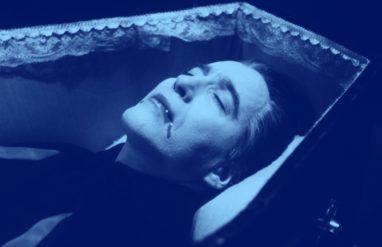Bullies are discussed a lot these days, but they aren’t something new. Tormenters have been around for a long time … especially in literature. Let’s take an inside look at the characters who are bullies and learn about their consequences.
Marion Hawthorne
In the 1964 children’s novel, Harriet the Spy by Louise Fitzhugh, Marion Hawthorne is a smart-mouthed, entitled classroom bully. It’s never determined why she is so mean, but it could be that she’s the teacher’s pet and doesn’t want anyone to take her throne.
She knows what to say, and how to say it in order to get her way, and thrives on making Harriet’s life miserable. Case in point: when she reads Harriet’s diary out loud in class and has everyone turn against her.
But, Harriet triumphs after she is awarded the position of editor of the school paper (taking over Marion’s spot) where she writes a letter to her class apologizing for her hurtful words in her diary. Because everyone likes a comeback.
Estella Havisham
Charles Dickens’ well-known 1861 novel, Great Expectations, features Estella Havisham, a total man-eater. She is an orphan raised by the wealthy (and rotten) Miss Havisham, who taught Estella all men are evil.
Estella is known to break hearts, including poor Pip (another orphan who is infatuated with her), tormenting him by marrying his rival, Bentley Drummle, simply for his money. When Pip meets Estella again, he sees she has finally softened, but it’s too late, for his heart no longer belongs to her.
Miss Trunchbull
Miss Trunchbull is the cruel antagonist in Roald Dahl’s 1988 Matilda. As the headmistress of Crunchem Hall Primary School, Miss Trunchbull dislikes children and uses her hate to torture them both physically and mentally (she even has a torture chamber in her office). Remember the spikes?!
But, every bully has a weakness and Miss Trunchbell’s is ghosts. Matilda uses that to her advantage, using her telekinesis to terrorize her out of her home and into a loony bin.
Draco Malfoy
The blonde-haired Draco Malfoy is Harry Potter’s enemy throughout J. K. Rowling’s popular fantasy series … and for good reason. He’s mean and ignorant, laughing at Harry for being an orphan (and getting others to follow suit). When Malfoy eventually grows up, marries, and has a son, he lightens up on Harry.
It’s said Malfoy is based on some of the bullies the author experienced in school, and he is used to showcase bigotry—when people are judged from where they come from instead of who they are.
Iago
William Shakespeare’s Othello came about in 1603, bringing with it one bad bully. Meet Iago, a conniving villain who yearns for utter control of others, including Othello.
A master manipulator, Iago not only convinces Othello that his wife is being unfaithful but that he needs to kill her for her wrongdoings. After the murder, Othello can’t take his guilt and kills himself, while Iago is sent to prison to be tortured, awaiting his fate from Cassio, the Lord Governor. The moral of the story: what comes around goes around.
Julian
In R.J. Palacio’s 2012 novel, Wonder—a book that was inspired by Natalie Merchant’s song “Wonder” in hopes of educating others about being different—we meet young August “Auggie” Pullman. He is a fifth grader who has a facial abnormality that causes a lot of people to stare and kids to talk—especially the school bully Julian who leaves taunting notes in August’s locker and turns most of the school against him just because he looks different.
After a long struggle just trying to get by unnoticed by Julian and his friends, Auggie is surprised by a mean group of older kids on a school retreat only to have Julian’s friends help defend him. Soon Auggie isn’t so unpopular anymore … and Julian isn’t so present anymore.
Oskar Eriksson’s bullies
Let the Right One In is a 2004 Swedish novel by John Ajvide Lindqvist. It’s set in the ’80s and revolves around a young boy named Oskar Eriksson who is teased in school because he is a loner and without a father. Out of fear, he doesn’t stand up to his bullies.
But soon, he meets Eli, a vampire who resembles a girl his age and helps him build enough courage to stand up to his tyrants. In the end, he needs Eli’s help to fully take down the villains … even if it is by severing their heads.
Cordelia
In the 1988 novel, Cat’s Eye by Margaret Atwood, we see a story that follows the ups and downs of an unstable relationship and how damaging psychological torture can be, no matter what age or how long ago it took place. Growing up, Elaine Risley developed a strange friendship with Cordelia, a girl from school who was a psychological mess. She bullied Elaine then pretended to be her friend, playing this charade well until adulthood.
Throughout the story, Elaine grows stronger and eventually stops helping Cordelia when she needs it the most, leaving her feeling guilty and focused. Somehow even after disappearing from Elaine’s life, Cordelia still has power over her.
Jill Brenner
Judy Blume’s 1974 novel Blubber is told by Jill Brenner, a fifth-grade bully who goes after an overweight student named, Linda. Brenner joins in with other kids in school, giving Linda the nickname Blubber after her report on whales. They even strip her from her clothes in the bathroom.
But, things take a turn for Brenner when she finds Linda has joined forces with the bullies, inflicting the same misery she once endured.
Melody
We’re ending this list with an anti-bully: Melody in the 2010 young-adult novel, Out of My Mind by Sharon M. Draper. She is a young girl with cerebral palsy who is unable to move or talk freely, causing other kids, including Claire and Molly, to make fun of her and call her stupid.
While most adults consider her mentally challenged, Melody has a very high IQ and a photographic memory. She finally gets a computer that helps her communicate with her family (for the first time) and her classmates, which helps her get a spot in a national trivia competition. But, when a snowstorm changes plans and her class ends up going without her, she laughs off the trophy they bring back to show her, realizing she doesn’t need it (or them) to feel like a winner. Self-empowerment FTW.














